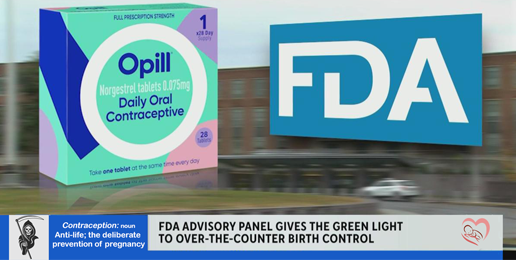
On July 13, the Food and Drug Administration (FDA) announced its approval of Opill, a form of birth control to be sold over the counter – no prescription needed. Opill will become available for purchase in early 2024. The FDA hasn’t placed any age restrictions on who may purchase the drug. Opill, the brand name of norgestrel (a synthetic version of progestin), is owned by HRA Pharma, which bought the pill with the aim of turning it into an over-the-counter drug.

Opill is designed to prevent pregnancy by preventing the release of an egg and thickening the mucus in the cervix to make it more difficult for sperm to reach the egg. If neither of these functions prevents pregnancy, Opill also thins the lining of the uterus, making it difficult for a zygote (fertilized egg, or newly-conceived human) to implant, effectively working as an abortifacient. Unfortunately, many forms of birth control actually serve as abortifacients if their initial function doesn’t prevent pregnancy.
The FDA’s decision to approve Opill for over-the-counter purchase with no age limits is being touted by pro-choice activists as a win for American women. According to National Public Radio (NPR), advocates celebrate it as “…expand[ing] access and giv[ing] women more control over their contraceptive decisions.” It’s the same wording used by abortion advocates; nice-sounding language that camouflages its practical meaning: “making it easier for more women to be promiscuous and not have to deal with a baby… just like men!”
Another talking point in celebration of Opill is that because it’s a progestin-only pill, not a progestin and estrogen pill, it’s safer to take. However, Opill comes with a lengthy list of side effects that include:
- increased risk of ectopic pregnancy
- irregular periods/bleeding
- nervousness
- dysmenorrhea (painful periods)
- ovarian cysts
- depression, especially in younger women
- and risk of some cancers
Information about these and more side effects and risks associated with Opill can be found on the FDA website and Live Action.
Additionally, no oral contraceptives (including Opill) protect against sexually transmitted infections (STIs), and as we learned from Scott Phelps at IFI’s 2023 Worldview Conference, STIs are on the rise. One of the main reasons for this is the push for contraceptives.
Contrary to the sentiment that over-the-counter birth control is a spectacular development, Opill will only serve to make our already heavily-sexualized culture worse. It makes it easier for women to pop the pill, do the thing, and not have to worry about getting pregnant. It makes it easier for men to take advantage of women. And it’s a gift to traffickers, who won’t have to worry about age restrictions or dealing with prescriptions to obtain an easy way to cover their tracks.
Birth control has become so widely used and accepted in our culture that doctors prescribe it to young girls for everything from acne to cramps. Selling it as an over-the-counter drug is not as great a move as proponents think, and the consequences – as much as proponents minimize them – could be deadly.






















